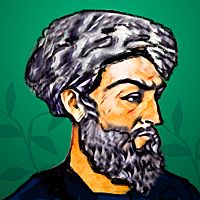Abu al-Abbas al-Nabati facts for kids
Quick facts for kids
Abu al-Abbas al-Nabati
|
|
|---|---|

Illustration of botanist Abual-Abbás al-Nabati.
|
|
| Born | 1166 |
| Died | 1239 |
| Nationality | Andalusian |
| Known for | Scientific classification |
| Scientific career | |
| Fields | Botanist, Scientist, Pharmacist, Jurist |
| Influences | Pedanius Dioscorides, Ibn Hazm |
| Influenced | Ibn al-Baitar |
Abu al-Abbas al-Nabati, also known as Ibn al-Rumiya, was a brilliant Andalusian scientist. He lived a long time ago, from 1166 to 1239. He was a botanist (someone who studies plants), a pharmacist (someone who knows about medicines), and a theologian (someone who studies religion).
He is famous for helping to create a new way of studying plants and medicines. He used experiments and careful observations to find out what was true. This helped develop the field of pharmacology, which is the study of how medicines work. He even taught another famous botanist named Ibn al-Baitar.
His Amazing Life Story
Abu al-Abbas al-Nabati's full name was Ahmad bin Muhammad bin Mufarrij bin Abdillah. He was born in Seville, which is in modern-day Spain, in the year 1166.
To learn as much as he could, Nabati traveled a lot. He went to places like North Africa, the Levant (which is part of the Middle East), and Iraq. In 1216, he spent some time in Alexandria, a famous city in Egypt. After all his travels and studies, he came back to Seville. There, he opened his own pharmacy.
Nabati was also a religious scholar. He studied different ideas and teachings. He passed away in 1239.
His Important Books
When Nabati returned to Spain, he wrote a very important book called Botanical Journey. This book was one of the first to describe many different plant and herb species. He wrote it based on all the plants he had seen and studied during his travels around the world.
He also wrote a detailed commentary on another famous book called Materia Medica. This original book was written by Pedanius Dioscorides a long time before Nabati. Nabati's commentary was like an encyclopedia. It brought together the work of Dioscorides and other scholars. It also included Nabati's own new discoveries about plants found in Spain and Portugal.
See also
 In Spanish: Abu al-Abbás al-Nabati para niños
In Spanish: Abu al-Abbás al-Nabati para niños
- Islamic science
- Islamic medicine
- Muslim Agricultural Revolution
- Islamic scholars
 | Ernest Everett Just |
 | Mary Jackson |
 | Emmett Chappelle |
 | Marie Maynard Daly |

